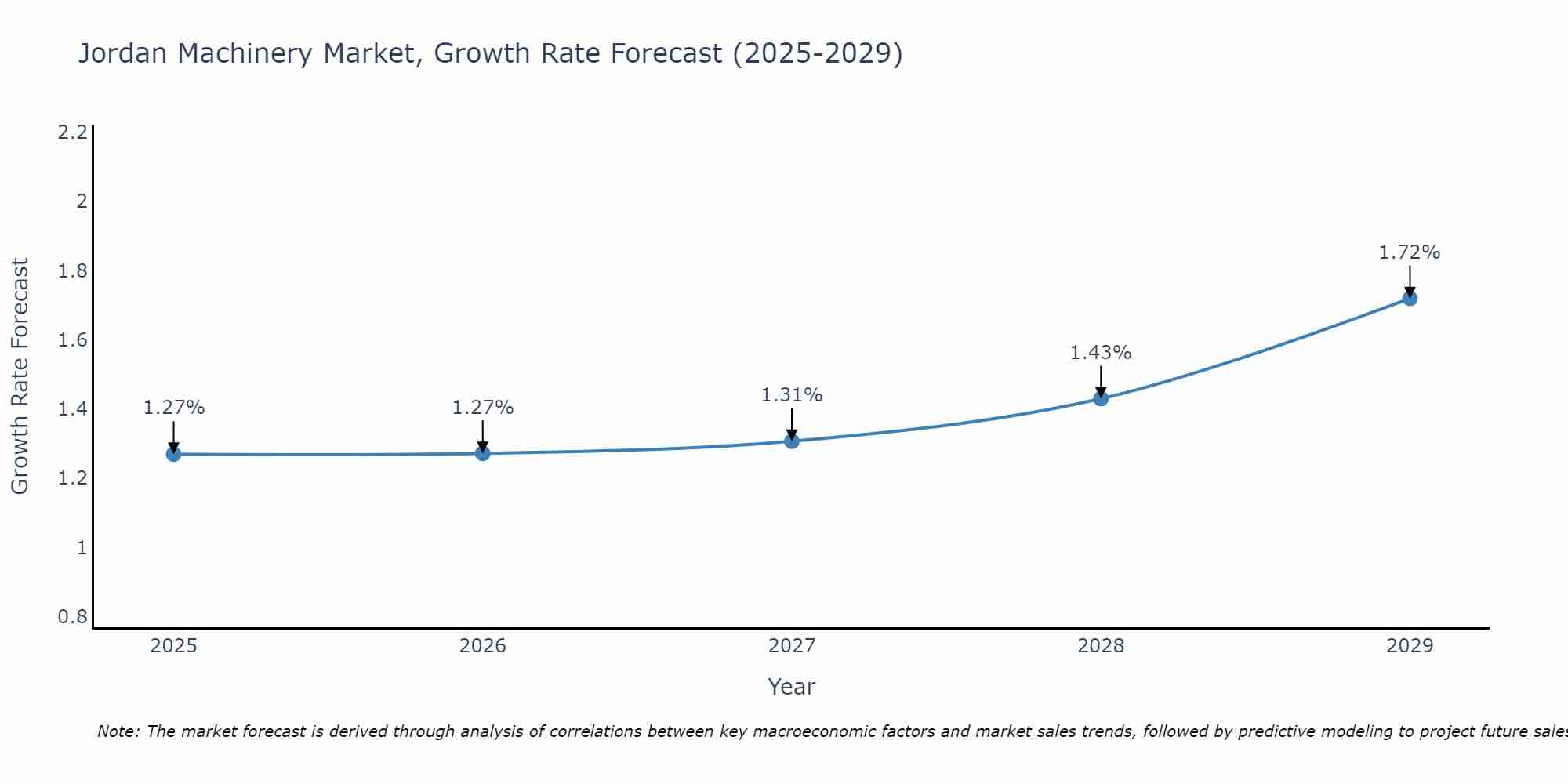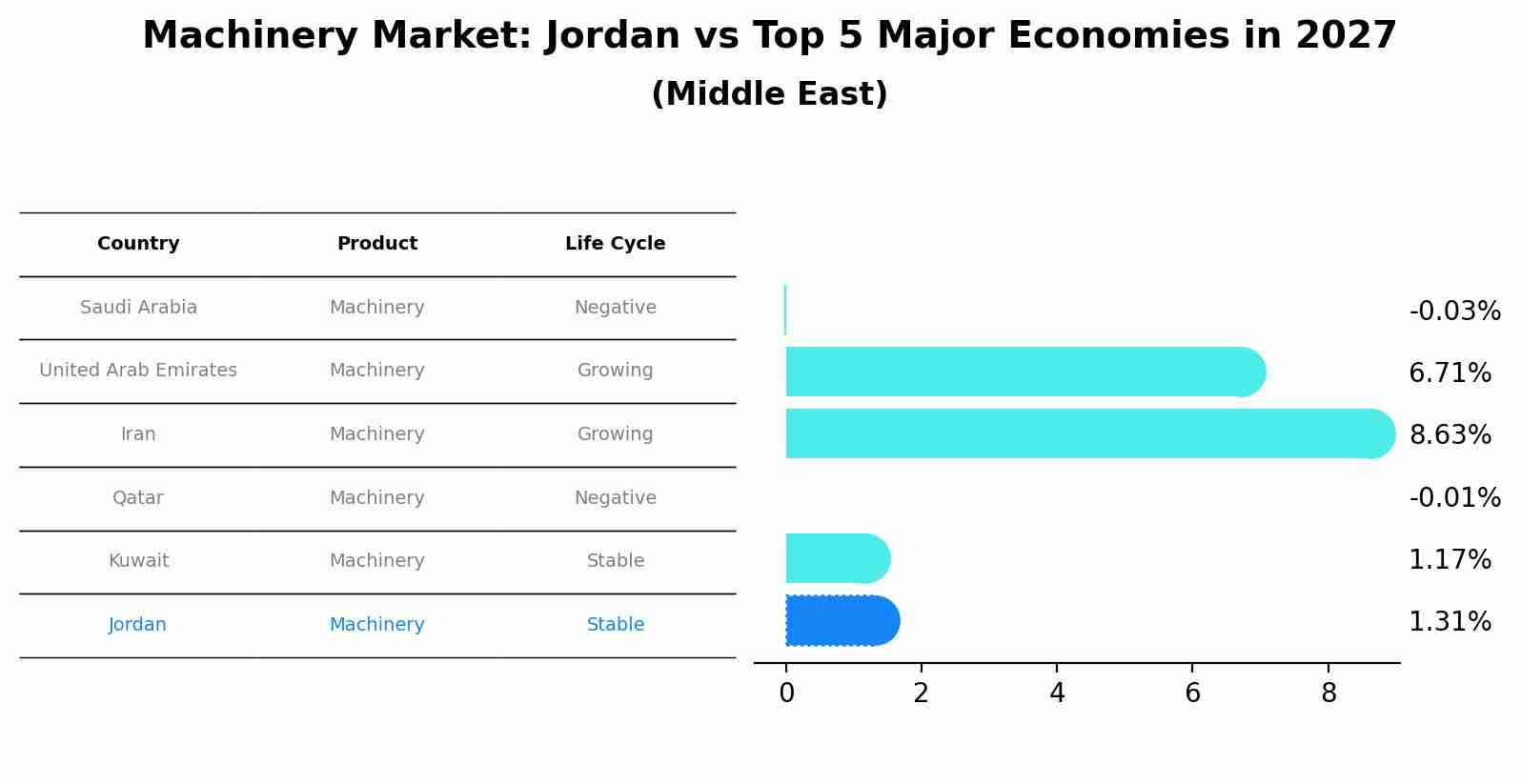Jordan Machinery Market (2025-2031) Outlook | Value, Share, Size, Companies, Trends, Forecast, Industry, Growth, Analysis & Revenue
| Product Code: ETC433182 | Publication Date: Oct 2022 | Updated Date: Jul 2025 | Product Type: Market Research Report | |
| Publisher: 6Wresearch | Author: Vasudha | No. of Pages: 75 | No. of Figures: 35 | No. of Tables: 20 |
Jordan Machinery Market Size Growth Rate
The Jordan Machinery Market is likely to experience consistent growth rate gains over the period 2025 to 2029. From 1.27% in 2025, the growth rate steadily ascends to 1.72% in 2029.

Machinery Market: Jordan vs Top 5 Major Economies in 2027 (Middle East)
In the Middle East region, the Machinery market in Jordan is projected to expand at a stable growth rate of 1.31% by 2027. The largest economy is Saudi Arabia, followed by United Arab Emirates, Iran, Qatar and Kuwait.

Jordan Machinery Market Synopsis
The Jordan machinery market is a dynamic and growing sector driven by various industries such as construction, agriculture, and manufacturing. The market offers a wide range of machinery and equipment including heavy machinery, agricultural machinery, construction equipment, and industrial machinery. Jordan`s strategic location and government initiatives to promote industrial and infrastructure development further contribute to the market`s growth. Key players in the market include both domestic manufacturers and international brands, providing customers with a wide selection of products to meet their specific needs. With increasing investments in infrastructure projects and the expansion of various industries, the Jordan machinery market is poised for continued growth and offers opportunities for both local and international companies to expand their presence in the region.
Jordan Machinery Market Trends
The Jordan Machinery Market is experiencing a shift towards digitalization and automation, driven by the increasing demand for efficiency and productivity in various industries such as manufacturing, construction, and agriculture. Companies are investing in advanced technologies such as IoT, AI, and robotics to streamline their operations and reduce costs. Additionally, there is a growing focus on sustainability and environmentally friendly solutions, leading to a rise in the adoption of eco-friendly machinery and equipment. The market is also witnessing a trend towards rental and leasing services as businesses look for flexible and cost-effective options. Overall, the machinery market in Jordan is evolving to meet the changing needs of industries and align with global trends towards digital transformation and sustainability.
Jordan Machinery Market Challenges
In the Jordan machinery market, several challenges are faced, including intense competition from both domestic and international manufacturers, fluctuating raw material prices, and changing regulations and trade policies. The market is also impacted by economic instability in the region, which affects consumer confidence and investment decisions. Additionally, technological advancements and the need for constant innovation pose challenges for companies to stay competitive and meet evolving customer demands. Access to financing and skilled labor can also be hurdles for businesses operating in the machinery market in Jordan. Overall, navigating these challenges requires companies to adapt quickly, invest in research and development, and build strong partnerships to thrive in this dynamic and competitive industry.
Jordan Machinery Market Investment Opportunities
The machinery market in Jordan presents various investment opportunities across sectors such as construction, agriculture, manufacturing, and transportation. With the country`s focus on infrastructure development and industrial growth, there is a rising demand for construction machinery, earthmoving equipment, and agricultural machinery. Additionally, the government`s initiatives to promote local manufacturing and increase exports create opportunities for investing in industrial machinery and equipment. The transportation sector also offers potential for investment in vehicles, logistics equipment, and fleet management solutions. Furthermore, there is a growing trend towards automation and digitalization, providing opportunities for investment in advanced machinery technologies. Overall, the Jordan machinery market offers diverse investment prospects for those looking to capitalize on the country`s economic development and industrial expansion.
Jordan Agar Market Government Policies
Government policies related to the Jordan Machinery Market focus on promoting local manufacturing and increasing competitiveness. The government offers incentives such as tax breaks, subsidies, and grants to encourage investment in the machinery sector. Import tariffs are also imposed to protect domestic manufacturers and support local production. Additionally, there are regulations in place to ensure compliance with safety and environmental standards, as well as to promote innovation and technology development within the industry. The government`s emphasis on supporting the machinery market through various policies aims to stimulate economic growth, create job opportunities, and enhance the country`s industrial capabilities.
Jordan Machinery Market Future Outlook
The future outlook for the Jordan Machinery Market appears positive, driven by factors such as increasing industrialization, infrastructure development projects, and the growing emphasis on automation and technology adoption across various sectors. With the government`s focus on economic diversification and attracting foreign investments, there is a rising demand for machinery and equipment in industries such as construction, manufacturing, and agriculture. Additionally, the implementation of initiatives to enhance the business environment and support entrepreneurship is expected to further fuel market growth. To capitalize on these opportunities, machinery manufacturers and suppliers in Jordan need to stay abreast of technological advancements, offer innovative solutions, and establish strong partnerships to meet the evolving needs of the market and maintain a competitive edge.
Key Highlights of the Report:
- Jordan Machinery Market Outlook
- Market Size of Jordan Machinery Market, 2024
- Forecast of Jordan Machinery Market, 2031
- Historical Data and Forecast of Jordan Machinery Revenues & Volume for the Period 2021 - 2031
- Jordan Machinery Market Trend Evolution
- Jordan Machinery Market Drivers and Challenges
- Jordan Machinery Price Trends
- Jordan Machinery Porter's Five Forces
- Jordan Machinery Industry Life Cycle
- Historical Data and Forecast of Jordan Machinery Market Revenues & Volume By Type for the Period 2021 - 2031
- Historical Data and Forecast of Jordan Machinery Market Revenues & Volume By Agriculture, Construction, And Mining Machinery for the Period 2021 - 2031
- Historical Data and Forecast of Jordan Machinery Market Revenues & Volume By Industrial Machinery for the Period 2021 - 2031
- Historical Data and Forecast of Jordan Machinery Market Revenues & Volume By Commercial And Service Industry Machinery for the Period 2021 - 2031
- Historical Data and Forecast of Jordan Machinery Market Revenues & Volume By Ventilation for the Period 2021 - 2031
- Historical Data and Forecast of Jordan Machinery Market Revenues & Volume By Heating for the Period 2021 - 2031
- Historical Data and Forecast of Jordan Machinery Market Revenues & Volume By Air-Conditioning for the Period 2021 - 2031
- Historical Data and Forecast of Jordan Machinery Market Revenues & Volume By Commercial Refrigeration Equipment for the Period 2021 - 2031
- Historical Data and Forecast of Jordan Machinery Market Revenues & Volume By Distribution Channel for the Period 2021 - 2031
- Historical Data and Forecast of Jordan Machinery Market Revenues & Volume By Supermarkets/Hypermarkets for the Period 2021 - 2031
- Historical Data and Forecast of Jordan Machinery Market Revenues & Volume By Convenience Stores for the Period 2021 - 2031
- Historical Data and Forecast of Jordan Machinery Market Revenues & Volume By E-Commerce for the Period 2021 - 2031
- Historical Data and Forecast of Jordan Machinery Market Revenues & Volume By Others for the Period 2021 - 2031
- Historical Data and Forecast of Jordan Machinery Market Revenues & Volume By Others for the Period 2021 - 2031
- Historical Data and Forecast of Jordan Machinery Market Revenues & Volume By Nature for the Period 2021 - 2031
- Historical Data and Forecast of Jordan Machinery Market Revenues & Volume By Organic for the Period 2021 - 2031
- Historical Data and Forecast of Jordan Machinery Market Revenues & Volume By Conventional for the Period 2021 - 2031
- Jordan Machinery Import Export Trade Statistics
- Market Opportunity Assessment By Type
- Market Opportunity Assessment By Distribution Channel
- Market Opportunity Assessment By Nature
- Jordan Machinery Top Companies Market Share
- Jordan Machinery Competitive Benchmarking By Technical and Operational Parameters
- Jordan Machinery Company Profiles
- Jordan Machinery Key Strategic Recommendations
Frequently Asked Questions About the Market Study (FAQs):
Export potential assessment - trade Analytics for 2030
Export potential enables firms to identify high-growth global markets with greater confidence by combining advanced trade intelligence with a structured quantitative methodology. The framework analyzes emerging demand trends and country-level import patterns while integrating macroeconomic and trade datasets such as GDP and population forecasts, bilateral import–export flows, tariff structures, elasticity differentials between developed and developing economies, geographic distance, and import demand projections. Using weighted trade values from 2020–2024 as the base period to project country-to-country export potential for 2030, these inputs are operationalized through calculated drivers such as gravity model parameters, tariff impact factors, and projected GDP per-capita growth. Through an analysis of hidden potentials, demand hotspots, and market conditions that are most favorable to success, this method enables firms to focus on target countries, maximize returns, and global expansion with data, backed by accuracy.
By factoring in the projected importer demand gap that is currently unmet and could be potential opportunity, it identifies the potential for the Exporter (Country) among 190 countries, against the general trade analysis, which identifies the biggest importer or exporter.
To discover high-growth global markets and optimize your business strategy:
Click Here- Single User License$ 1,995
- Department License$ 2,400
- Site License$ 3,120
- Global License$ 3,795
Search
Thought Leadership and Analyst Meet
Our Clients
Related Reports
- Saudi Arabia Car Window Tinting Film, Paint Protection Film (PPF), and Ceramic Coating Market (2025-2031) | Strategy, Consumer Insights, Analysis, Investment Trends, Opportunities, Growth, Size, Share, Industry, Revenue, Segments, Value, Segmentation, Supply, Forecast, Restraints, Outlook, Competition, Drivers, Trends, Demand, Pricing Analysis, Competitive, Strategic Insights, Companies, Challenges
- South Africa Stationery Market (2025-2031) | Share, Size, Industry, Value, Growth, Revenue, Analysis, Trends, Segmentation & Outlook
- Afghanistan Rocking Chairs And Adirondack Chairs Market (2026-2032) | Size & Revenue, Competitive Landscape, Share, Segmentation, Industry, Value, Outlook, Analysis, Trends, Growth, Forecast, Companies
- Afghanistan Apparel Market (2026-2032) | Growth, Outlook, Industry, Segmentation, Forecast, Size, Companies, Trends, Value, Share, Analysis & Revenue
- Canada Oil and Gas Market (2026-2032) | Share, Segmentation, Value, Industry, Trends, Forecast, Analysis, Size & Revenue, Growth, Competitive Landscape, Outlook, Companies
- Germany Breakfast Food Market (2026-2032) | Industry, Share, Growth, Size, Companies, Value, Analysis, Revenue, Trends, Forecast & Outlook
- Australia Briquette Market (2025-2031) | Growth, Size, Revenue, Forecast, Analysis, Trends, Value, Share, Industry & Companies
- Vietnam System Integrator Market (2025-2031) | Size, Companies, Analysis, Industry, Value, Forecast, Growth, Trends, Revenue & Share
- ASEAN and Thailand Brain Health Supplements Market (2025-2031) | Strategy, Consumer Insights, Analysis, Investment Trends, Opportunities, Growth, Size, Share, Industry, Revenue, Segments, Value, Segmentation, Supply, Forecast, Restraints, Outlook, Competition, Drivers, Trends, Demand, Pricing Analysis, Competitive, Strategic Insights, Companies, Challenges
- ASEAN Bearings Market (2025-2031) | Strategy, Consumer Insights, Analysis, Investment Trends, Opportunities, Growth, Size, Share, Industry, Revenue, Segments, Value, Segmentation, Supply, Forecast, Restraints, Outlook, Competition, Drivers, Trends, Demand, Pricing Analysis, Competitive, Strategic Insights, Companies, Challenges
Industry Events and Analyst Meet
Whitepaper
- Middle East & Africa Commercial Security Market Click here to view more.
- Middle East & Africa Fire Safety Systems & Equipment Market Click here to view more.
- GCC Drone Market Click here to view more.
- Middle East Lighting Fixture Market Click here to view more.
- GCC Physical & Perimeter Security Market Click here to view more.
6WResearch In News
- Doha a strategic location for EV manufacturing hub: IPA Qatar
- Demand for luxury TVs surging in the GCC, says Samsung
- Empowering Growth: The Thriving Journey of Bangladesh’s Cable Industry
- Demand for luxury TVs surging in the GCC, says Samsung
- Video call with a traditional healer? Once unthinkable, it’s now common in South Africa
- Intelligent Buildings To Smooth GCC’s Path To Net Zero


















